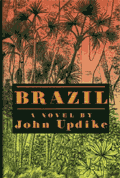 This book review was originally published in the Baltimore Evening Sun on May 2, 1994.
This book review was originally published in the Baltimore Evening Sun on May 2, 1994.
Write a score of enthusiastically received novels, break sexual and racial taboos, and successfully subvert literary conventions, and you might think you can do anything.
Only a writer with as many accolades under his belt as John Updike could write a book like Brazil, the sixteenth novel by the New England writer and certainly one of his most daring. All at once, Brazil seeks to be an interracial love story, a time-shattering fable, and a sociological treatise. Remarkably, Updike nearly succeeds in all three.
The novel chronicles the twenty-year relationship between white, upper-class beauty Isabel and black, fatherless thief Tristao, from their initial meeting on the beaches of Rio de Janeiro to their flight through South America and eventual return. It’s a novel with a strange narrative structure, one that will occasionally leapfrog several years in a single sentence without warning.
From the instant Tristao and Isabel catch sight of each other, they fall deeply and irreversibly in love, the type of instantaneous love that can only happen in novels. Although racial tension doesn’t run as deeply in Brazil as in the United States, Isabel’s bourgeois father (a government ambassador) doesn’t approve of her giving her future to a penniless thief born from a prostitute. As if the difference in races weren’t enough, Updike exaggerates the social gap to mythical proportions: Tristao’s mother literally rolls around in darkness and filth numbed to the world by drink, while Isabel bathes in showers with adjustable water nozzles and luxurious towels.
The two decide to flee the wrath of Isabel’s father and his men and construct their own future together, in a journey which involves multiple losses of innocence for them both. Isabel becomes initiated in the dark pleasures of sex as well as the toils of life in the lower classes; Tristao learns that there is more to living life than caring for one’s self.
Soon Brazil moves from the merely implausible to the highly ridiculous. Tristao and Isabel meander from the squalor of gold mining to the hunger of wandering the South American deserts to slavery at the hands of a troop of colonial fanatics. Isabel experiments with prostitution and motherhood and lesbianism, while Tristao vacillates between protector and provider and delinquent.
Updike’s most preposterous twist occurs when Tristao and Isabel switch races with the help of an old shaman’s magic. This transformation allows for a series of reflections on the nature of the races which skitters dangerously close to (and sometimes crosses over) the line of offensiveness. Updike, not content to skim along the surface of black and white love, brings out the deepest taboos between the races: master and slave relationships, differences in genitalia, social standing. He writes of the Africanized Isabel at one point as “not a social and spiritual equal but a thing of the flesh, imported from afar.”
Such statements, however, don’t really convey the racist message they might seem to at first glance. What Updike is really trying to do is capture the thought processes which lead to the tyrannical racial prejudices which enslave us all. It is Tristao and Isabel’s triumph that they can transmute the wedge that divides them into the source of pleasure which keeps their love strong and vibrant.
This novel is a good, but not great work. The American author attempts to tell his audience things about Brazil. But by moving “from the merely implausible to the highly ridiculous” he loses some credibility. At times, it feels he bite off more than he could chew.
I thought this novel was really good. It drew you into the characters and made you feel their struggle. I’m not sure it would have the same effect on everyone, considering the the relationship i’m currently in where neither family approves. Overall though, I think its a great read.
I liked the novel so much that I translated it into my mother tongue. Why does Mr Corbett and some others demand from the late Mr Updike that he should have stuck strictly to the magical realism of the S-America in certain parts of the book, as in changing the races, or the like? Has J.U. given some oath to do it? He didn’t have to! In fact, he couldn’t do it, for the novel is, all in all, a piece of irony whereas the magical realism is not; in fact it seems he’s laughing at it.
His irony in this book has more than one layer. In the final chapter, every layer is brought to its end.